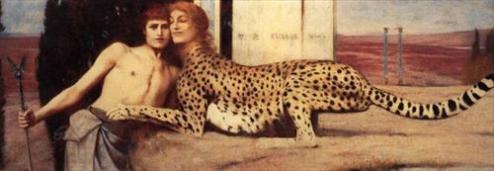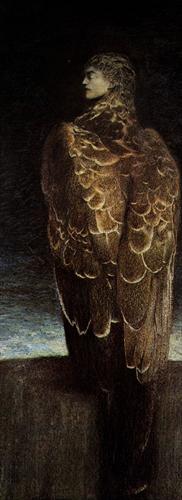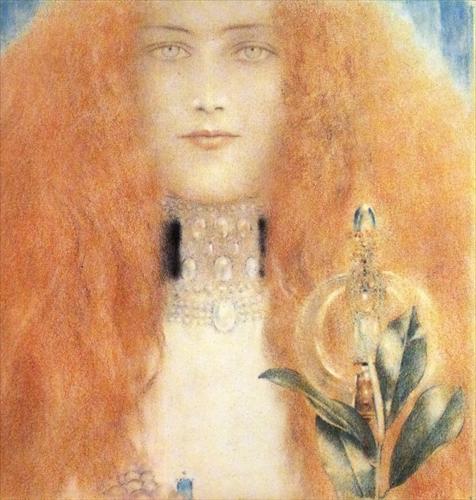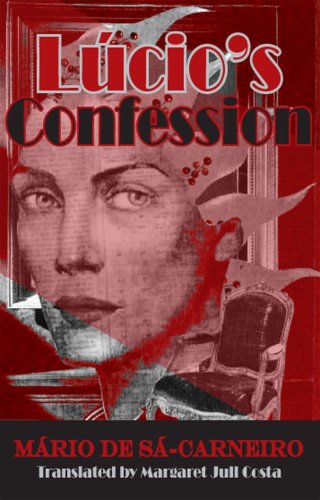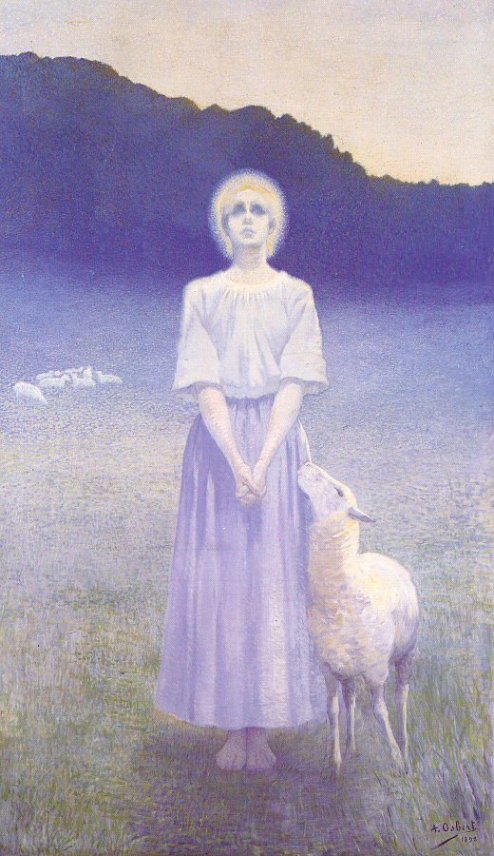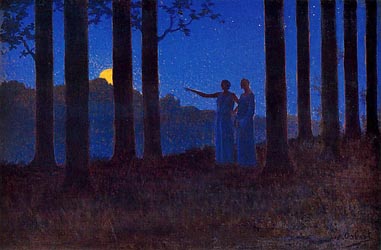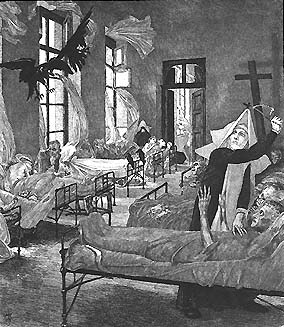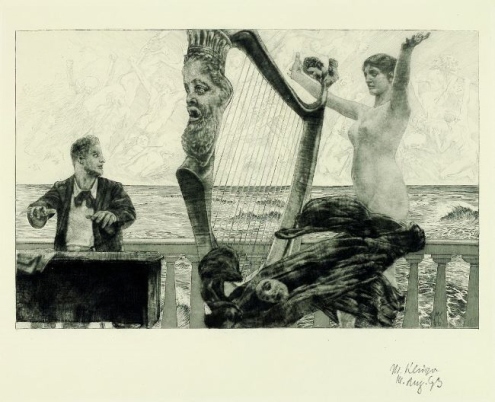Fernand Khnopff
Fernand Khnopff (1858 – 1921) was a Belgian Symbolist artist whose distinctive style would win him great success during his lifetime, and influenced other artists in the movement, most notably Gustav Klimt. While Realism was the most advanced style in Belgium at the start of his career, it wasn’t enough for Khnopff: Jeffery Howe states that he ‘insisted that art must suggest the essential mystery behind the visible facts and facades.’ His work is full of allegorical imagery and mystical allusions. He almost exclusively used his sister Marguerite as his model, and his relationship with her was intense and jealous. In many of his paintings of her, he accentuates her jawline to create a more androgynous appearance, blurring the boundaries between gender, creating a fluid sexuality. There’s an eeriness to his work, and a sense of isolation that is at once compelling and discomforting.
Mario de Sa-Carneiro – Lucio’s Confession
The Portuguese writer Mario de Sa-Carneiro (1890-1916) is a somewhat tragic figure: he committed suicide in Paris when he was just 26. Although he did not produce much in his short life, he is considered to be one of the most influential writers of the Portuguese Modernism movement. His poems and stories almost always toy with conceptions of what is real, and delve into the Decadent concepts of madness, excess, sickness and sexuality. There is a general sense of distaste towards, and fear of, women in his writing, as well as a strong homosexual undercurrent.
Sa-Carneiro writes in the first person, ‘I’, forcing the reader to confront the speaker head-on, and experience the intensity of the story being told as if it is being related directly to them. It also seems to be a method of personal exorcism for the author. Plagued by fears of madness, he purges the horrors and fantasies of his mind into his work in the hope of absolution.
Lucio’s Confession is no exception to this rule. It is a remarkably intense novella, consisting of the written confession of Lucio, a writer, detailing the events leading up to his accusation for a crime he did not commit. He tells the story of his intense friendship with the enigmatic poet Ricardo de Loureiro, from their meeting at a decadent party in Paris. Ricardo is a tortured eccentric, plagued by his inability to truly possess the people he cares for. He eventually marries a beautiful and mysterious woman named Marta, and she and Lucio soon begin an affair. However, it is not long before Lucio begins to question who Marta really is and whether she even exists at all. He descends deeper and deeper into confusion and madness, until events culminate in tragedy.
It’s a quick read, comprising only 121 pages, but one which leaves a lasting impression. I have never read anything quite like the works of Mario de Sa-Carneiro.
Baudelaire’s banned poems
I haven’t discussed Baudelaire for a while now, which is nothing short of a travesty. Here is another of his infamous banned poems, condemned for being far too explicit at the initial publication of Les Fleurs du Mal in 1857. It’s called ‘The metamorphosis of the vampire’, and it’s fraught with sexual guilt and religious allegory.
Les Métamorphoses du vampire
La femme cependant, de sa bouche de fraise,
En se tordant ainsi qu’un serpent sur la braise,
Et pétrissant ses seins sur le fer de son busc,
Laissait couler ces mots tout imprégnés de musc:
— «Moi, j’ai la lèvre humide, et je sais la science
De perdre au fond d’un lit l’antique conscience.
Je sèche tous les pleurs sur mes seins triomphants,
Et fais rire les vieux du rire des enfants.
Je remplace, pour qui me voit nue et sans voiles,
La lune, le soleil, le ciel et les étoiles!
Je suis, mon cher savant, si docte aux voluptés,
Lorsque j’étouffe un homme en mes bras redoutés,
Ou lorsque j’abandonne aux morsures mon buste,
Timide et libertine, et fragile et robuste,
Que sur ces matelas qui se pâment d’émoi,
Les anges impuissants se damneraient pour moi!»
Quand elle eut de mes os sucé toute la moelle,
Et que languissamment je me tournai vers elle
Pour lui rendre un baiser d’amour, je ne vis plus
Qu’une outre aux flancs gluants, toute pleine de pus!
Je fermai les deux yeux, dans ma froide épouvante,
Et quand je les rouvris à la clarté vivante,
À mes côtés, au lieu du mannequin puissant
Qui semblait avoir fait provision de sang,
Tremblaient confusément des débris de squelette,
Qui d’eux-mêmes rendaient le cri d’une girouette
Ou d’une enseigne, au bout d’une tringle de fer,
Que balance le vent pendant les nuits d’hiver.
The Metamorphoses of the Vampire
Then the woman with the strawberry mouth,
Squirming like a snake upon the coals,
Kneading her breasts against the iron of her corset,
Let flow these words scented with musk:
— “I have wet lips, and I know the art
Of losing old conscience in the depths of a bed.
I dry all tears on my triumphing breasts
And I make old men laugh with the laughter of children.
For those who see me naked, without any covering,
I am the moon and the sun and the sky and the stars!
I am so dexterous in voluptuous love, my dear, my wise one,
When I strangle a man in my dreadful arms,
Or abandon my breast to his biting,
So shy and lascivious, so frail and vigorous,
That on these cushions that swoon with passion
The powerless angels damn their souls for me!”
When she had sucked the pith from my bones
And, drooping, I turned towards her
To give her the kiss of love, I saw only
An old leather bottle with sticky sides and full of pus!
I shut both eyes in cold dismay
And when I opened them both to clear reality,
By my side, instead of that powerful puppet
Which seemed to have taken some lease of blood,
There shook vaguely the remains of a skeleton,
Which itself gave the cry of a weathercock
Or of a sign-board, at the end of a rod of iron,
Which the wind swings in winter nights.
trans. Geoffrey Wagner, 1974
As we know, the femme fatale was one of the staples of Decadent literature. Carnality and sexual desire are aligned with the demonic, and acting on desire produces only destruction and loathing. Once again, a predatory female preys on a passive man. It is interesting to compare this with ‘Allegory’ another of Baudelaire’s poems about a prostitute, but one where the woman remains somehow pure and good in spite of her profession.
Alphonse Osbert
Alphonse Osbert (1857-1939) was a French Symbolist who exhibited at the Rose+Croix salons (founded in 1892 by Josephin Peladan with the intention of providing Symbolist art with ideological underpinnings). He was influenced by Pointillism, and his paintings have an ethereal, otherworldly quality to them, and I think his depiction of light is quite lovely.
Oscar Wilde
I found this lovely animation dedicated to the life and works of Oscar Wilde, by lucylou21, and I thought I’d share.
Viktor Vasnetsov
Viktor Vasnetsov (1848-1926) was a Russian artist who, while not directly affiliated with the Symbolist movement, nevertheless exhibits many of its traits in his work: religious iconography, mythology, dark sensuality. He was one of the key figures in the evolution of Russian art in the nineteenth century as it moved from realism to something that was more in the style of Art Nouveau. In later years, he worked in Kiev with Mikhail Vrubel, whose work was admired by many Symbolists, and had a lot of influence on the younger artist.
Hashish, Wine, Opium
I recently finished reading a collection of essays on narcotics by Theophile Gautier and Charles Baudelaire, Hashish, Wine, Opium (trans. Maurice Stang). It was an interesting read, not only because it provided insight into the experimentations made by members of the Decadent movement with certain drugs, but also because it provided a wonderful contrast between the attitudes and literary styles of the two French masters.
In his introduction, Derek Stanford writes about how drug use heavily influenced the use of ‘synaesthesia’ – a blending of the senses – frequently used in Decadent writing. Smells are seen in colour and music has a taste. He also comments on the different ways the subject matter is approached by the two writers – Gautier as a poet, Baudelaire as a scientist. These differing attitudes become even clearer upon reading the essays.
Gautier emphasises the fantastical, spiritual elements of drug consumption in his three essays (which are really more semi-autobiographical works of fiction), ‘The Opium Pipe’, ‘The Club of Assassins’ and ‘Hashish’. He dwells on the wonderful – and sometimes terrifying – visions that the consumption of narcotics provides, and indicates that they can be a source of artistic inspiration.
“I could hear the very sounds of the colours. Sounds which were green, red, blue or yellow, reached my ears in perfectly distinct waves” (p.59).
Baudelaire, on the other hand, was clearly not an admirer of narcotic drugs, preferring the ‘consoling’ influence of wine. Gautier witnessed Baudelaire’s attendance at a couple of the drug parties he attended, but wrote that his fellow poet was often only there as an observer: “This happiness, bought at the chemists, was repugnant to him.” Indeed, Baudelaire’s essay ‘Wine and Hashish’ (which can be seen as a prelude to his book Les Paradis Artificiels), is particularly damning of the use of narcotics. Written in the acerbic style which initially attracted me to Baudelaire, the essay is often highly amusing in its criticism of aspects of humanity that the poet found especially distasteful. On the use of narcotics, he writes:
“Hashish is not favourable to action. It does not console like wine; it merely develops to an immoderate degree the human personality in the circumstances in which it finds itself at a given place and time” (p.89).
I enjoyed the book. The use of drugs in the 19th century and its influence on art and literature is a topic I find very compelling, and it’s interesting to examine the attitudes of two of the great frontrunners in the Decadent movement towards the subject.
Max Klinger
Max Klinger (1857-1920) was a German-born artist whose work had a strong influence on other Symbolists such as Otto Greiner and Alfred Kubin. He achieved much acclaim during his lifetime for his fantastical engravings, the most famous perhaps being the Paraphrase on the Discovery of a Glove series. He was also a talented sculptor, as witnessed in his remarkable statue of Beethoven.
He was inspired by Goya’s paintings of the supernatural and the bizarre, and Michael Gibson wrote of him that his work is ‘characterised by the development of an imaginary world which is both realistic and slightly out of kilter with reality, thus giving an impression of the uncanny.”
Decadent Quotations
I’ve just started studying for a PhD, and until I get settled and have time to organise a proper post, I thought I’d share some of my favourite quotes on the subject of Decadence.
“I like this word decadent; all shimmering and purple and gold.”- Paul Verlaine
“The happiest state will always be that in which depravity of manners and morals is most universal.” – The Marquis de Sade
“What is termed sin is an essential element of progress. Without it the world would stagnate or grow old or become colourless. Through its intensified assertion of individualism it saves us from the commonplace.” – Oscar Wilde
“The style of decadence is nothing else than art at that extreme point of maturity produced by those civilisations which are growing old, their suns low in the sky – a style that is ingenious, complicated, learned, full of shades of meaning and research, always pushing further… taking colours from all palates, notes from all keyboards… obscure phantasies at which the daylight would be amazed.” – Theophile Gautier
“What is it in absinthe that makes it a separate cult? The effects of its abuse are totally distinct from those of other stimulants. Even in ruin and in degradation it remains a thing apart: its victims wear a ghastly aureole all their own, and in their peculiar hell yet gloat with a sinister perversion of pride that they are not as other men.” – Aleister Crowley
“As a small child, I felt in my heart two contradictory feelings, the horror of life and the ecstasy of life.” – Charles Baudelaire
“I shall not live; I am an odd girl and I shan’t be able to hold on to this life which I don’t know how not to lead and that I can equally no longer endure. Take me, take me anywhere you like; I shan’t bother you. I sleep all day; in the evening you can let me go to the theatre; and at night you can do with me what you will!” – Marie Duplessis, in a letter to Franz Liszt
“From the moment of my birth, the angels of anxiety, worry, and death stood at my side, followed me out when I played, followed me in the sun of springtime and in the glories of summer. They stood at my side in the evening when I closed my eyes, and intimidated me with death, hell, and eternal damnation.” – Edvard Munch
“Hysteria and degeneration have always existed; but they formerly showed themselves sporadically, and had no importance in the life of the whole community. It was only the vast fatigue which was experienced by the generation on which the multitudes of discoveries and innovations burst abruptly, imposing on it organic exigencies greatly surpassing its strength, which created favourable conditions under which these maladies could gain ground enormously, and become a danger to civilization.” – Max Nordau, Degeneration
“We delight in what you call our corruptions of style, and we delight at the same time the refined people of our race and our time. It remains to be seen whether our exception is not an aristocracy, and whether, in the aesthetic order, the majority of suffrages represents anything else than the majority of ignorances…. It is a self-deception not to have the courage of one’s intellectual pleasure. Let us delight, therefore, in our singularities of ideal and of form, even if we must shut ourselves up in a solitude without visitors.” – Paul Bourget
“The following point must be emphasized: the function of the flame which attracts and burns is exercised, in the first half of the century, by the Fatal Man (the Byronic hero), in the second half by the Fatal Woman; the moth destined for sacrifice is in the first case the woman, in the second the man. It is not simply a case of convention and literary fashion: literature, even in its most artificial forms, reflects to some extent aspects of contemporary life. It is curious to follow the parabola of the sexes during the nineteenth century: the obsession for the androgyne type towards the end of the century is a clear indication of a turbid confusion of function and ideal. The male, who at first tends towards sadism, inclines, at the end of the century, towards masochism.” – Mario Praz, from The Romantic Agony
“Art is the only clean thing on earth, except holiness.” – Joris-Karl Huysmans
While I recognize the necessity for a basis of observed reality… true art lies in a reality that is felt. – Odilon Redon
“Alas, human vices, however horrible one might imagine them to be, contain the proof (were it only in their infinite expansion) of man’s longing for the infinite; but it is a longing that often takes the wrong route. It is my belief that the reason behind all culpable excesses lies in this deprivation of the sense of the infinite.” – Charles Baudelaire
Edgar Allan Poe – The Raven
A little Poe for Hallowe’en.
Once upon a midnight dreary, while I pondered, weak and weary,
Over many a quaint and curious volume of forgotten lore–
While I nodded, nearly napping, suddenly there came a tapping,
As of some one gently rapping, rapping at my chamber door.
“‘Tis some visiter,” I muttered, “tapping at my chamber door–
Only this and nothing more.”
Ah, distinctly I remember it was in the bleak December,
And each separate dying ember wrought its ghost upon the floor.
Eagerly I wished the morrow;–vainly I had sought to borrow
From my books surcease of sorrow–sorrow for the lost Lenore–
For the rare and radiant maiden whom the angels name Lenore–
Nameless here for evermore.
And the silken sad uncertain rustling of each purple curtain
Thrilled me–filled me with fantastic terrors never felt before;
So that now, to still the beating of my heart, I stood repeating
“‘Tis some visiter entreating entrance at my chamber door–
Some late visiter entreating entrance at my chamber door;
This it is and nothing more.”
Presently my soul grew stronger; hesitating then no longer,
“Sir,” said I, “or Madam, truly your forgiveness I implore;
But the fact is I was napping, and so gently you came rapping,
And so faintly you came tapping, tapping at my chamber door,
That I scarce was sure I heard you”–here I opened wide the door–
Darkness there and nothing more.
Deep into that darkness peering, long I stood there wondering, fearing,
Doubting, dreaming dreams no mortals ever dared to dream before;
But the silence was unbroken, and the stillness gave no token,
And the only word there spoken was the whispered word, “Lenore?”
This I whispered, and an echo murmured back the word, “Lenore!”–
Merely this and nothing more.
Back into the chamber turning, all my sour within me burning,
Soon again I heard a tapping something louder than before.
“Surely,” said I, “surely that is something at my window lattice;
Let me see, then, what thereat is and this mystery explore–
Let my heart be still a moment and this mystery explore;–
‘Tis the wind and nothing more.
Open here I flung the shutter, when, with many a flirt and flutter,
In there stepped a stately Raven of the saintly days of yore.
Not the least obeisance made he; not a minute stopped or stayed he,
But, with mien of lord or lady, perched above my chamber door–
Perched upon a bust of Pallas just above my chamber door–
Perched, and sat, and nothing more.
Then the ebony bird beguiling my sad fancy into smiling,
By the grave and stern decorum of the countenance it wore,
“Though thy crest be shorn and shaven, thou,” I said, “art sure no craven,
Ghastly grim and ancient Raven wandering from the Nightly shore–
Tell me what thy lordly name is on the Night’s Plutonian shore!”
Quoth the Raven, “Nevermore.”
Much I marvelled this ungainly fowl to hear discourse so plainly,
Though its answer little meaning–little relevancy bore;
For we cannot help agreeing that no living human being
Ever yet was blessed with seeing bird above his chamber door–
Bird or beast upon the sculptured bust above his chamber door,
With such name as “Nevermore.”
But the Raven, sitting lonely on that placid bust, spoke only
That one word, as if its soul in that one word he did outpour
Nothing farther then he uttered; not a feather then he fluttered–
Till I scarcely more than muttered: “Other friends have flown before–
On the morrow he will leave me, as my Hopes have flown before.”
Then the bird said “Nevermore.”
Startled at the stillness broken by reply so aptly spoken,
“Doubtless,” said I, “what it utters is its only stock and store,
Caught from some unhappy master whom unmerciful Disaster
Followed fast and followed faster till his songs one burden bore–
Till the dirges of his Hope that melancholy burden bore
Of ‘Never–nevermore.'”
But the Raven still beguiling all my sad soul into smiling,
Straight I wheeled a cushioned seat in front of bird and bust and door;
Then, upon the velvet sinking, I betook myself to linking
Fancy unto fancy, thinking what this ominous bird of yore–
What this grim, ungainly, ghastly, gaunt, and ominous bird of yore
Meant in croaking “Nevermore.”
This I sat engaged in guessing, but no syllable expressing
To the fowl whose fiery eyes now burned into my bosom’s core;
This and more I sat divining, with my head at ease reclining
On the cushion’s velvet lining that the lamp-light gloated o’er,
But whose velvet violet lining with the lamp-light gloating o’er
She shall press, ah, nevermore!
Then, methought, the air grew denser, perfumed from an unseen censer
Swung by Seraphim whose foot-falls tinkled on the tufted floor.
“Wretch,” I cried, “thy God hath lent thee–by these angels he hath sent thee
Respite–respite and nepenthe from thy memories of Lenore!
Quaff, oh quaff this kind nepenthe and forget this lost Lenore!”
Quoth the Raven, “Nevermore.”
“Prophet!” said I, “thing of evil!–prophet still, if bird or devil!–
Whether Tempter sent, or whether tempest tossed thee here ashore,
Desolate, yet all undaunted, on this desert land enchanted–
On this home by Horror haunted–tell me truly, I implore–
Is there–is there balm in Gilead?–tell me–tell me, I implore!”
Quoth the Raven, “Nevermore.”
“Prophet!” said I, “thing of evil!–prophet still, if bird or devil!
By that Heaven that bends above us–by that God we both adore–
Tell this soul with sorrow laden if, within the distant Aidenn,
It shall clasp a sainted maiden whom the angels name Lenore–
Clasp a rare and radiant maiden whom the angels name Lenore.”
Quoth the Raven, “Nevermore.”
“Be that word our sign of parting, bird or fiend!” I shrieked, upstarting–
“Get thee back into the tempest and the Night’s Plutonian shore!
Leave no black plume as a token of that lie thy soul has spoken!
Leave my loneliness unbroken!–quit the bust above my door!
Take thy beak from out my heart, and take thy form from off my door!”
Quoth the Raven, “Nevermore.”
And the Raven, never flitting, still is sitting, still is sitting
On the pallid bust of Pallas just above my chamber door;
And his eyes have all the seeming of a demon’s that is dreaming
And the lamp-light o’er him streaming throws his shadows on the floor;
And my soul from out that shadow that lies floating on the floor
Shall be lifted–nevermore!

